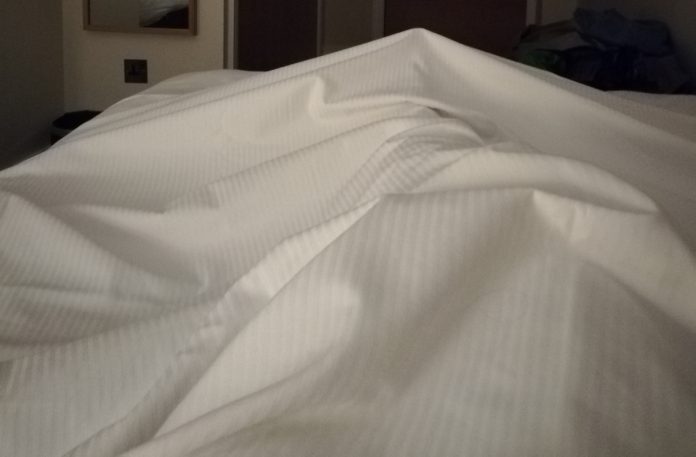by Rita Siligato
Seven o’clock in the morning: in the dark, Redenta hears the familiar chimes of the City Hall clock and the buzzing of the upsetting alarm on the other side of the bed. It keeps ringing on and on with a petulant loud voice, every ding angrier than the previous one, sharper and sharper.
“Dario! You forgot to turn off the alarm again! Dario!”
She slips on his side of the bed to silence the awful voice of the small item, on the way feeling the empty tangled sheets… there’s no one here. Seven in the morning is an impossible time for Redenta to be up and about. She needs to sleep in the morning – for too many years she had to wake up at 6:30 to be ready for work; four girls and mama in the house meant endless beelines at the sink for one’s ablutions – and now she enjoys staying in bed half asleep, or reading till 11:00 if she can, and then going outside for a good coffee at a nearby café.
“Dario!”
She hears him shuffling from the bathroom to the bedroom.
“Yes, Redenta?”
“You forgot… never mind.”
Looking at him, his curly head all grey, his eyes rheumy and lusterless, his short figure bent, she feels ashamed of what she wanted to tell him.
“Redenta, I am going to the seaside for a quick dip. I must take the next bus, before the crowd. I will be home in a couple of hours.”
“Do not forget your walking stick! And be careful at Barcola, a friend told me that they saw thieves at the beach. Do not leave your things unguarded.”
“There is no one at the Topolini at this hour. People are lazy. They wake up at ten and come to the seaside only to chat and sunbathe. Bye, girl, I must run.”
I must run, she thinks. He is walking like a hypothetical snail with a walking stick, a very old and slow snail. An eighty-six year old snail.
She sits up: “Dario, are you sure you want to go to Barcola?”
“I always go to Barcola in the summer. I want to be there early. First in, first out. You are making me late for the bus.”
“And… Dario, on your way home, please buy some bread and a packet of flour.”
“I will if I remember. Bye for now, girl.”
She bites her nails, an old habit she has. She looks around in her bedroom, their bedroom now. She listens to his labored breathing, to his unsteady pace. She hears the clinking of the keys in the door lock and the slamming of the door.
She is fully awake, now. She walks to the bathroom. He left the damp towel in the sink again. His toothbrush is near the glass, thank God not on the floor with his pajama this time, and the slippers are by the door. She does not know if they made the right thing, agreeing to live together after so many years. She loves to have him around the house, she is happy to cook for him – she did it for many years before, when they didn’t live together – but she could not stand his habits in her home.
She tried and tried: she coaxed him into her way of life. And he tried to get her to adapt to his own routines.
“There is no way,” she says out loud. “I have to tell him to go back to his home. We are married, must be honest with each other.”
What to do now? She has too many hours to spare this morning. To go back to bed seems an impossible task. She gets washed, then she gets dressed, then she sits in the small davenport by the window with a book. She cannot read; she thinks of a kind way to tell him about her decision.
He is back: she hears the keys in the door, his shaky steps. He brings in a sea fragrance and carries three small packets in his hand: flour, bread and a tiny white cardboard box: “Your favorite, Redenta! Rigójancsi pastries! Let’s have them right away, before lunch!”
His eyes are young and shining, his smile is unbelievably innocent. Maybe she could wait till tomorrow. Maybe he will understand what it means to be married. Maybe they will both understand.





























